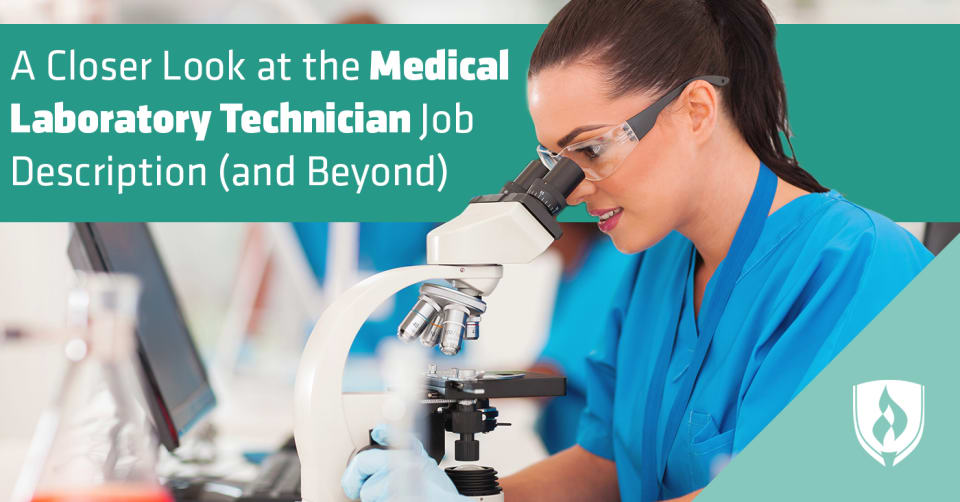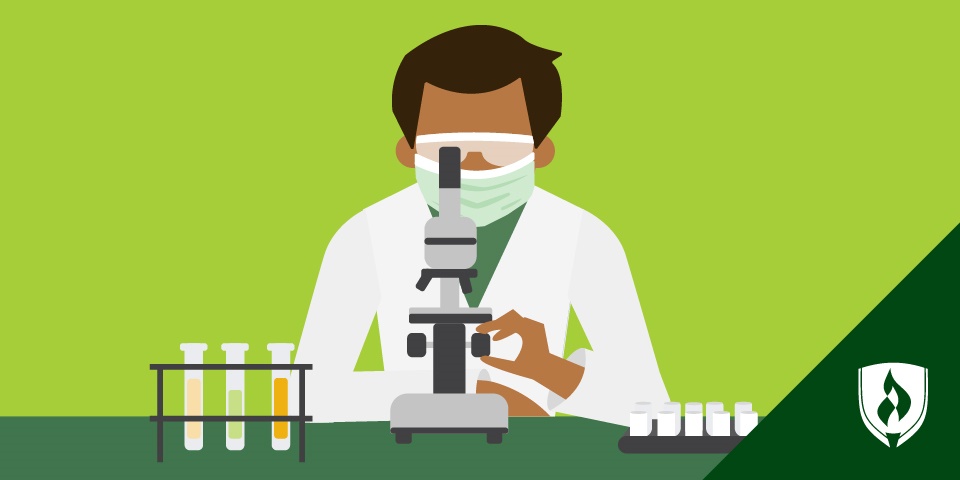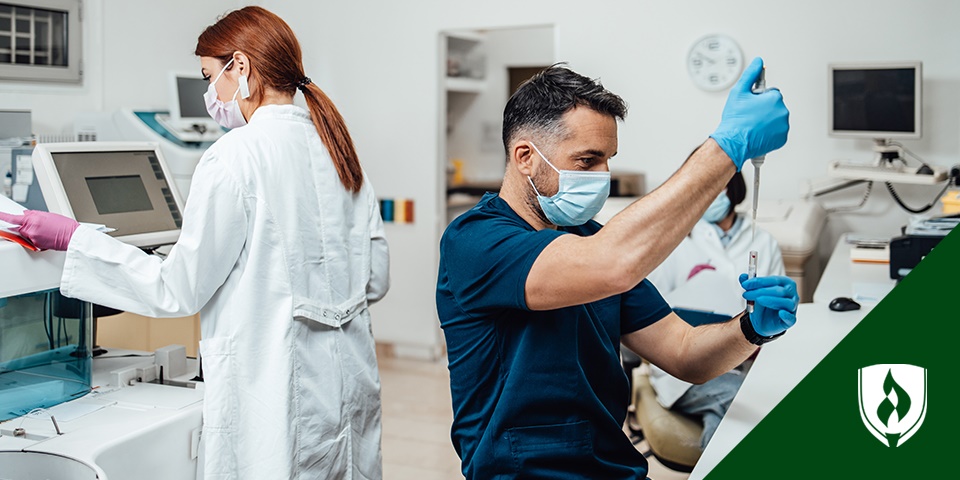A Closer Look at the Medical Lab Technician Job Description (and Beyond)
By Anjali Stenquist on 06/08/2020

Healthcare workers play a big role in holding our communities together. The process of providing medical care involves all kinds of professionals. From highly visible workers like doctors and nurses, to the many critical individuals working behind the scenes, medical care is a collaborative effort involving people with different areas of expertise.
While they might not be front-and-center in most folks’ minds, medical lab technicians play a critical role in our healthcare system. From the routine tests your doctor orders during a physical, to the dire moments of an unexpected health crisis, a medical lab technician has likely been involved in you or your loved one’s medical care whether or not you were aware.
Who are medical lab technicians and what kind of skills and qualifications does it take to become one? We’ll take a deep dive into this unique and important position within healthcare to understand what it is truly like to be a medical lab technician beyond a medical lab technician job description.
What is a medical lab technician?
Medical lab technicians work with doctors on the diagnostic process. When a person is ill, the most accurate information about what is making them sick lives in their bodies. Blood and tissue cells can be tested in order to reveal what truly afflicts a person and whether a treatment is working.
A medical lab technician is a trained professional that runs these tests on samples collected from patients. The results of a medical lab technician’s tests are then interpreted by physicians. The accuracy of the test is essential for patients to receive effective medical care.
What are common medical lab technician duties?
Medical lab technicians (sometimes also called medical laboratory assistants or clinical lab technicians) work under the supervision of a medical laboratory technologist. Medical lab technicians most often work in a general capacity with whatever samples come into a lab; however, some medical lab technicians may specialize given the needs and constraints of their workplace. Medical lab technicians may sometimes be responsible for collecting samples from patients.
According to the Bureau of Labor Statistics (BLS), common duties include:1
- Analyzing body fluids (e.g. blood, urine) and tissue samples and recording their findings
- Studying blood samples for use in transfusions
- Operation of sophisticated lab equipment like microscopes and cell counters
- Using automated equipment and computerized instruments to conduct larger scale testing
- Logging data into medical records
Where do medical lab technicians work?
As their name suggests, medical lab technicians work in laboratories. These are commonly found in hospitals, doctor’s offices, clinics, diagnostic laboratories, and research facilities. These specialized work environments come with significant differences from what you might see in a typical office job.
Because lab technicians are often working with samples that could potentially be infectious, laboratories are kept under strict sanity conditions and require workers to wear lab coats, masks, goggles, and gloves when working with samples.
What technical skills do you need to be a medical lab technician?
Medical lab technicians need a firm understanding of many specific procedures and protocols—so what are employers seeking? We analyzed over 112,000 medical lab technician job postings from the past year to help answer that question and identified some of the top technical skills employers were seeking:2
- Quality assurance and control
- Chemistry
- Phlebotomy
- Laboratory testing
- Patient care
- Customer service
- Laboratory equipment
- Data entry
- Microbiology
- Specimen collecting
Beyond the technical skills, you’ll need critical thinking ability, communication skills and a well-tuned eye for the little things.
“Laboratory professionals need a keen eye for details. Sometimes the smallest abnormality leads to a specific diagnosis,” says Tammy Renner, Medical Laboratory Technician Program Director at Rasmussen College.
What are the educational requirements for medical lab technicians?
Due to the many important technical skills required to become a medical lab technician, aspiring medical lab technicians will need a college education. The BLS states that medical lab technicians usually have a postsecondary certificate or an Associate’s degree.1 It should be noted that this is a role that some states may require medical lab techs to obtain licensure in order to work. Aspiring medical lab techs will want to first research what, if any, licensure requirements exist for their state. The BLS notes some states licensure standards may require medical lab technicians to earn a certification as well.1
Looking beyond the medical lab technician job description:
We’ve covered most of the basic information about medical lab technicians. But what is it really like to work in this specialized healthcare role? Here are three insights that go beyond what you might find in a medical lab technician job description:
1. You will be working under time pressure
Medical testing is a critical part of providing treatment and assessing whether that treatment is working. Sometimes, the speed at which those test results reach doctors can make the difference in a patient living or dying. Because of this incredible responsibility, medical lab technicians may work under intense pressure to complete their work with as much speed and accuracy as possible.
This can be good or bad, depending on how you handle it—and if you’re excellent at channeling that pressure into an intense focus, you might just love it.
“Emergency units, ICUs and operating rooms can be stressful situations due to the critical nature of the environment and patient situations,” explains Renner. “Medical lab technicians need to remain calm and perform testing quickly and accurately.”
2. You will need to follow strict safety protocols
Medical lab technicians handle many different kinds of samples and testing materials. In the case of infectious diseases, medical lab technicians do run the risk of exposure. For this reason among others, working as a medical lab technician means following safety protocols exactly in order to minimize any risk to yourself and those around you. Beyond your personal safety, these protocols are also important for maintaining accuracy—a mishandled sample could contaminate others and ruin testing efforts.
3. You are making a difference in the world
There is no doubt that working as a medical lab technician has unique stress; however, it is a job that makes a huge impact on people’s lives and global public health. Though medical lab technicians are rarely in the spotlight or the subject of medical dramas on TV, their contribution to medical diagnostics saves lives. That’s a pretty amazing thing to think of after a long, tough day at work.
Do you have a future in the medical lab?
Now that you know the basics of what a medical lab technician does, and a bit of additional information on the actual life of a medical lab technician, you may want to learn more about how you might take on this critical healthcare role. Take a look at the Rasmussen College Medical Lab Technician Associate’s Degree page for more information.
1Bureau of Labor Statistics, U.S. Department of Labor, Occupational Outlook Handbook, [accessed May, 2020] https://www.bls.gov/ooh/healthcare/clinical-laboratory-technologists-and-technicians.htm. Information represents national, averaged data for the occupations listed and includes workers at all levels of education and experience. This data does not represent starting salaries. Employment conditions in your area may vary.
2Burning-Glass.com (analysis of 112,450 medical lab tech jobs, Apr. 01, 2019 - Mar. 30, 2020).
EDITOR’S NOTE: This article was originally published in 2017. It has since been updated to include information relevant to 2020.




